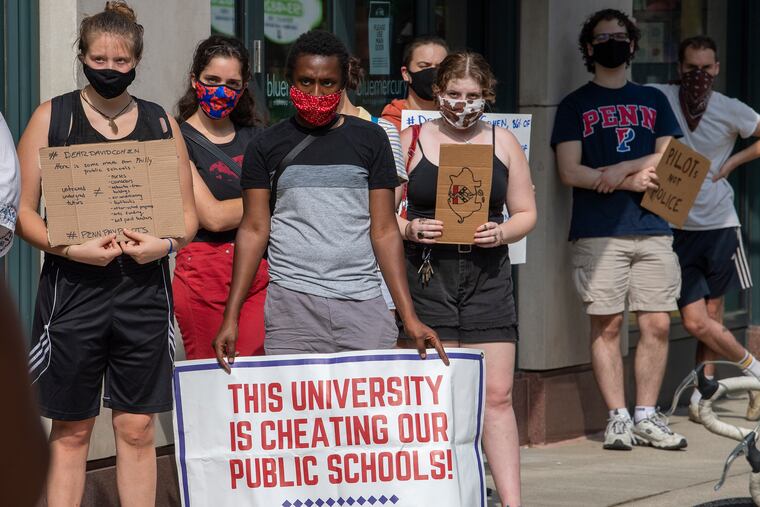Penn and other institutions should be willing to discuss property tax exemptions | Editorial
Avoiding this conversation ignores the extraordinary reckoning about race, equity, and justice now energizing the Penn community and others across the city and the nation.

The University of Pennsylvania — which like other nonprofits is exempt from city property taxes — remains unwilling even to discuss whether it should instead make annual payments to support Philadelphia’s public schools. David L. Cohen, president of Penn’s board of trustees, said in July that a new petition calling for such a contribution merely rehashes arguments the university has long rejected. “Penn’s position,” he declared, “has not changed.”
Cohen’s own rehash of his university’s long-standing intransigence on the issue ignores the extraordinary reckoning about race, equity, and justice now energizing the Penn community and others across the city and the nation. There’s a new urgency behind questions such as whether Penn, Drexel, and Jefferson Universities, as well as other big property-owning nonprofits in Philly, need to do more, and do better.
Nearly 1,000 Penn faculty and students so far have signed a petition being circulated by a campus group called Penn for PILOTs (payments in lieu of taxes). The citywide coalition Philadelphia Jobs With Justice is calling for what it describes as “mega-nonprofits” Penn, Drexel, and Jefferson to donate 40% of what they would be paying in property taxes to the coalition’s proposed Philadelphia Education Equity Fund; Penn for PILOTs also supports this approach.
» READ MORE: Penn professors call for university to pay taxes to support Philly schools
This targeted approach is in synch with Penn’s educational mission, including its many worthy programs in public schools citywide. Setting up a stand-alone fund should allay concerns about how PILOTs paid directly into the city’s general fund would be spent. That was the case when the university did make such payments between 1995 and 2000, when Cohen was chief of staff to then-Mayor Ed Rendell.
If such an arrangement made sense when Philly was emerging from the near-bankruptcy of the early ’90s, a better, more targeted reboot makes even more sense now. Many city school buildings are beset by contamination with asbestos, mold, or lead. State underfunding of Philly schools is a perennial concern. And public attention is focused on the underresourcing of communities of color, particularly given the toll of gun violence, over-policing, and COVID-19.
Philly is the poorest of the nation’s biggest cities, with one-quarter of its residents living below the federally defined poverty line. Yet the city continues to provide one of the nation’s wealthiest private universities, and other major nonprofit institutions, with an extraordinarily generous annual subsidy: a 100% property tax break.
» READ MORE: $29.6 billion of Philly real estate is exempt from property taxes. Should nonprofits be asked to pay up?
The presence of Penn, Drexel, and Jefferson benefits the city and the region in countless ways. But being in the city benefits them as well. All three universities are behind massive real estate projects reshaping the skylines on either side of the Schuylkill. Anyone who doubts the value of even a 10% abatement, let alone an exemption, in city property taxes should take note of the rush among private apartment developers to beat the pending reduction in that incentive.
Penn and other big tax-exempt nonprofits do not have unlimited funds especially amid the COVID-19 crisis; endowments carry restrictions and stewardship requirements. But asking them to directly invest in public education in their hometown is a reasonable request deserving more than stony silence. A lively conversation about PILOTs for nonprofits is already underway. It’s time for Penn and other big players to be part of it.